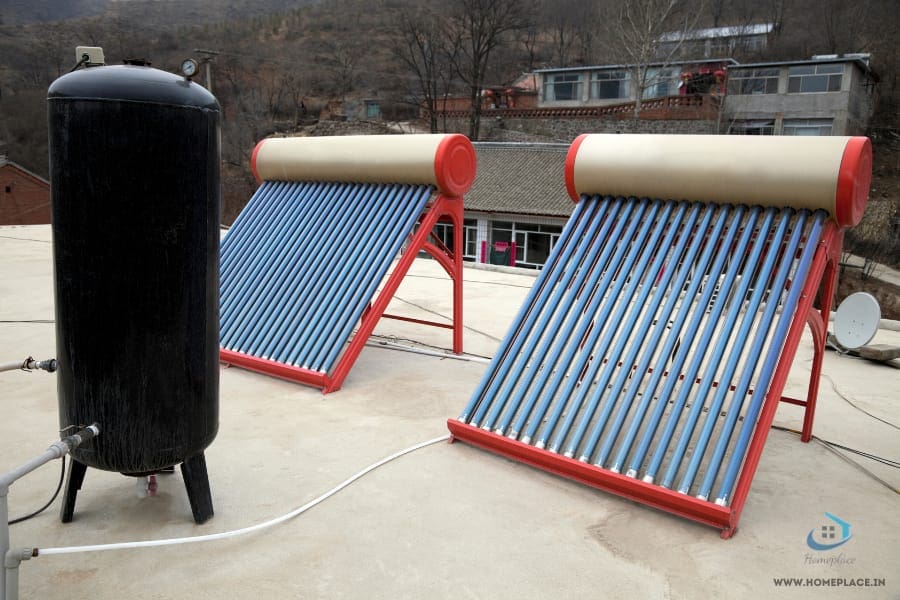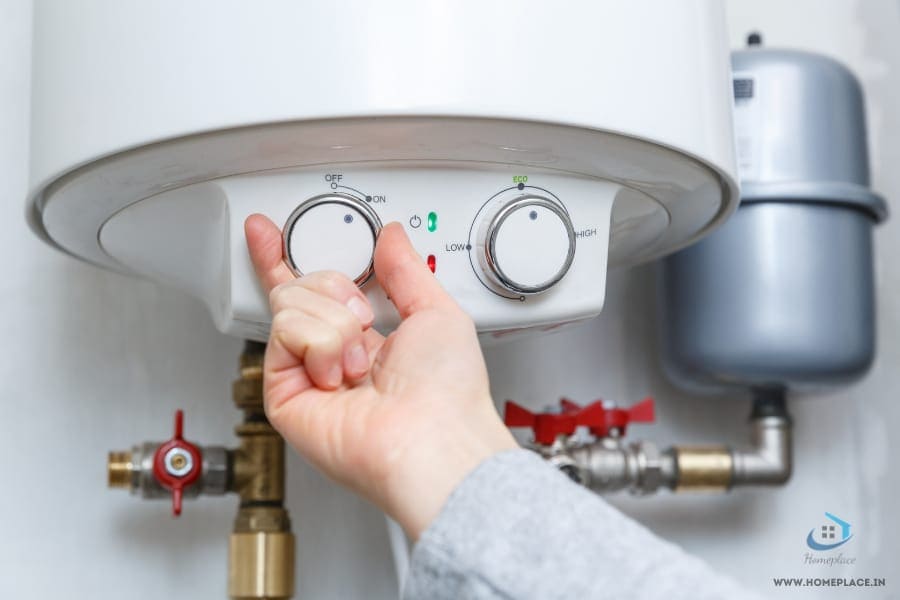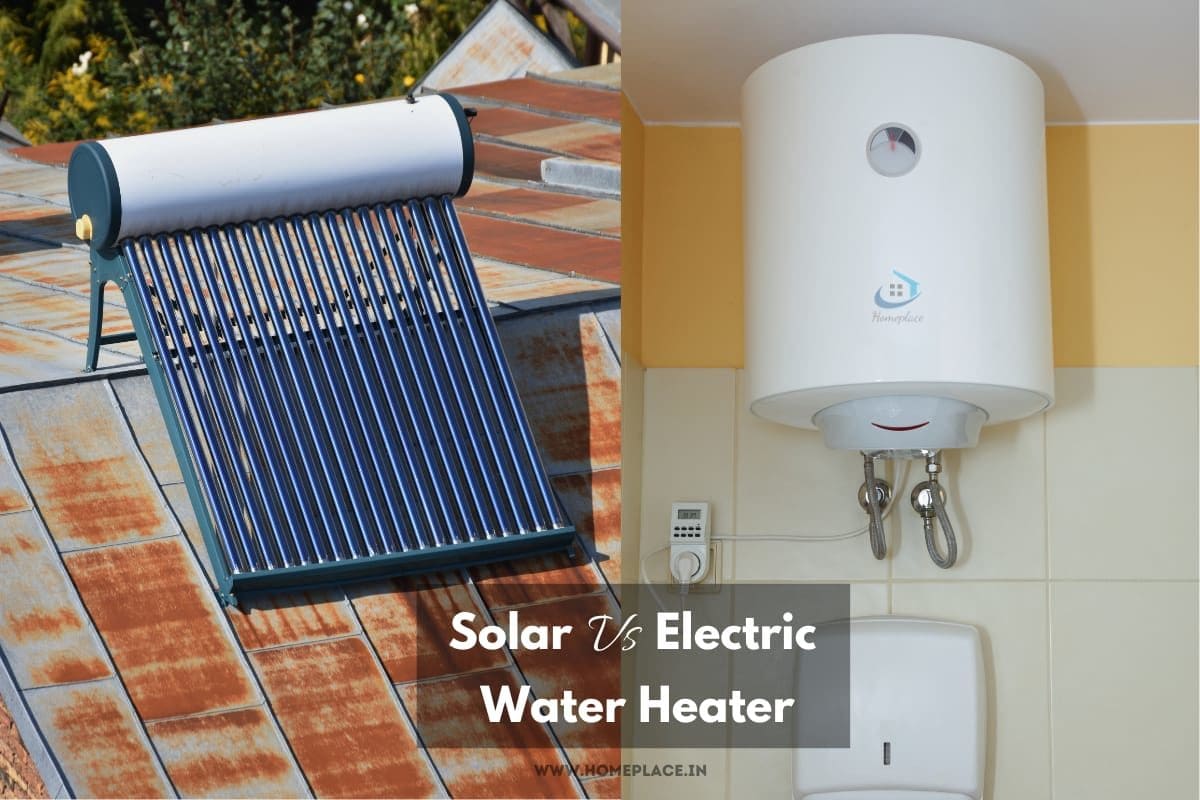While electric geysers are pretty common in every household, solar water heaters are slowly gaining popularity because of their eco-friendly, energy-saving characteristics. If you are looking for a new water geyser at your home but are confused about which one to choose, you must compare them and find out their differences.
However, both of these water-heating home appliances have their own perks. In this article, you will get a comparative idea about solar water heaters vs. electric geysers with various advantages and disadvantages to find out the worthiest.
What is a Solar Water Heater?
A solar water heater is a type of water geyser that runs on solar power. It is a more cost-effective appliance but involves heavy installation work. Solar water heaters are gaining immense popularity after the Ministry of New and Renewable Energy, Govt. of India, started providing subsidies. MNRE specified a benchmark cost for solar water heaters with concentrators, reflectors, and evacuated tube collectors. Under certain conditions, the rate of subsidy is-
- 30% of the benchmark or actual cost of solar water heaters in all states.
- 60% of the benchmark or actual cost for states like Meghalaya, Assam, Arunachal Pradesh, Sikkim, J&K, Himachal Pradesh, Uttarakhand, and islands.

The best solar water heaters depend entirely upon solar energy to generate power, making them practically free to use in the long run. Let’s discuss their pros and cons in detail.
Solar Water Heater Advantages
Disadvantages of Solar Geyser
Best Uses of Solar Water Heaters
What is an electric water geyser?
In comparison to solar water heaters, electric geysers have been around for some time now after almost replacing fuel-based gas geysers. As the name suggests, electric water heaters or geysers use a heating element to convert electrical energy into heat energy. This heat is transferred to the supply water inside the inner tank of electric geysers. The temperature is retained for a longer time with the help of insulation and coating materials.
There are mainly two types of electric geysers-
- Instant Geyser: As the name suggests, instant electric geysers are instantaneous in heating the water and making it ready for use. This type of water heater is smaller in size and has a capacity usually of up to 3 liters. The best instant water heaters are ideal for kitchens and small bathrooms. They are available in the price range from ₹1000 to ₹5000.
- Storage Geyser: Storage electric geysers have a higher capacity than instant geysers. If you have a medium or large bathroom, a storage water heater of 4-8 liters would be ideal, depending on the family size. Compared to instant geysers, storage geysers are costlier in the price range of ₹4000 to ₹10000.

Advantages of electric geysers
Disadvantages of Electric Geyser
Best Uses of Electric Water Heater

Electric Geyser vs solar water heater Comparison
| Point of Difference | Solar Water Heater | Electric Water Geyser |
|---|---|---|
| Size and Weight | Solar water heaters require 3 to 5 times the space needed for an electric geyser. For example, a 200 LPD solar water heater weighs around 60 Kg and can occupy up to 3.28 square meters of area. | Electric water heaters are much smaller and occupy less space than solar geysers. They’re lightweight and more petite. |
| Installation Flexibility | Installing solar water heaters is tedious, expensive, and requires expert assistance at all times. | Electric water heaters are comparatively easy to install and provide installation flexibility. |
| Portability | Electric water heaters are entirely independent of weather conditions. No matter what the climate condition is, an electric geyser will function as long as the electricity supply is available. | Electric geysers are also hard to move around. However, they are more portable than solar water heaters due to their lightweight and smaller size. |
| Heating Time | This type of water heater relies on solar energy and thus takes quite a bit of time to heat water. | Tankless electric water heaters can heat the water almost instantaneously. However, it’s not the same with storage electric geysers. |
| Heating Capacity | These water heaters can hold and heat 100-300 liters of water in around 6-12 hours, depending on the availability and intensity of sunlight. | Electric geysers have a heating capacity of 3-50 liters of water in 2-60 minutes. The capacities can vary for different manufacturers. |
| Safety | As solar water heaters do not run on electricity, they barely have any risk of short circuits. Most manufacturers cap the maximum heat of water at around 85°C. | Electric water heaters can undergo short circuits that can cause harm to the users. However, such instances are rare and can be minimized with voltage stabilizers. |
| Weather Dependency | Solar water heaters rely heavily on climatic conditions. They need constant sunlight for at least 5-6 hours to heat a whole load of water in the tank satisfactorily. So, solar water heaters can’t function in cloudy weather. | Electric water heaters are relatively easy to use, requiring a mere press of the switch and twist of the faucet. |
| Electricity Consumption | Since these water heaters harness solar energy to generate power, their electricity consumption is practically zero. | Electricity consumption by electric geysers is generally higher, especially in the case of storage water heaters. |
| Cleaning and Maintenance | The solar panels of those geysers catch dust quickly, which can hinder the overall performance of these geysers. So, they need cleaning once or twice every month. | Electric geysers need relatively less cleaning and maintenance than solar geysers. |
| Ease of Use | Solar water heaters are based on new technology that most people are unaware of. Sometimes, these reasons make them complicated to use. | Electric water heaters are relatively easy to use, requiring a mere press of the switch and a twist of the faucet. |
| Price Range | Solar water heaters are expensive, with a price from ₹17000 to ₹30000 for a capacity of 100-300 LPD. | Electric geysers are more affordable than solar water heaters. They come with a price tag starting from as low as ₹1000 and increasing to ₹10000. |
Differences between electric and solar water heaters
The water-holding capacity of solar water heaters is much higher than electric geysers. For instance, you can easily avail a 100-300 L solar water heater on the market. In the case of electric geysers, the capacity ranges from 1 liter to 50 liters. For example, Racold Alpha Pro 100 Lpd solar water heater comes with a capacity of 300 liters. On the other hand, AO Smith HSE-VAS-X-025 electric geyser can hold up to 25 liters of water.
The size and weight of a water heater are crucial factors in differentiating between an electric geyser and a solar geyser. Solar water heaters can occupy a large area of your roof and are extremely heavy. On the other hand, electric water heaters are compact and lightweight. For example, the Racold Alpha Pro 100 LPD solar water heater weighs about 40 kilograms and has dimensions of 19.65 x 11.75 x 11.5 meters. In contrast, an electric water heater from the same brand (Racold) weighs just about 2.7 kilograms and with a dimension of 0.33 x 0.21 x 0.20 meters.
Installing solar water heaters is tedious, time-consuming, and can’t be done without expert assistance. On the other hand, installing an electric geyser is way easier than solar water heaters. However, expert assistance is required in either case.
Solar water heaters are not portable due to their heavy weight and the complications of disassembling the installation. On the other hand, electric water heaters are relatively lightweight and easily reinstalled at any location.
The heating capacity of a water heater depends on how fast the heater can increase the water temperature to the desired level. Under normal circumstances and constant sunlight, a solar water heater can take up to 5-6 hours to heat the water in the 200 L tank. However, electric geysers excel because they take only a few minutes to heat water.
Safe operating condition is essential when it comes to home appliances. Using a solar water heater is safer than electric geysers as they do not have any direct connection to the electricity supply. Furthermore, solar water geysers are mounted on the roof and not in the interior, keeping users away from any harm whatsoever.
A geyser should function properly regardless of the weather outside. However, a solar water heater won’t work well unless the sky is free of clouds. That being said, solar geysers rely heavily on climatic conditions. On the other hand, electric water heaters work flawlessly as long as electricity is available. It does not matter whether it’s raining or snowing outside.
The electricity consumption of a home appliance is the power required by the device within a specific time period. Since solar water heaters rely solely on solar energy, their electricity consumption is zero. However, electric water heaters such as the Faber FWG Vulcan are rated at 2000 watts of power. If you are unsure about it, use this calculator to compute the power consumption of all home appliances, including water geysers.
Solar water heaters are exposed to the environment and thus require frequent cleaning. The solar panels attached to these geysers need attention to absorb sunlight effectively. On the other hand, you can expect your electric water heater to need professional service every year.
In general, both electric and solar water heaters are easy to use. However, instant geysers take the game even further. Just move the faucet, and your instant water heater will provide you with heated water. Overall, electric geysers offer better ease of use than solar water heaters.
The price range involves the initial investment you need to make while installing a water heater. In that case, Racold Alpha Pro 100 LPD solar water heater will cost you around ₹33000. The price of electric water heaters is comparatively lower, with geysers starting at ₹2700 (Crompton rapid jet geyser).
Overall, which is better – solar or electric geyser?
If you live in a remote area where voltage fluctuations and power cuts are expected, solar water heaters are the best bet for you. It is also a perfect choice for people who prefer using eco-friendly devices. However, electric water heaters should satisfy you better if you don’t want to rely on the weather condition and don’t mind the extra electricity costs. As an alternative to solar and electric water heaters, you can also find gas geysers that run on LPG or PNG.
Related Post:
